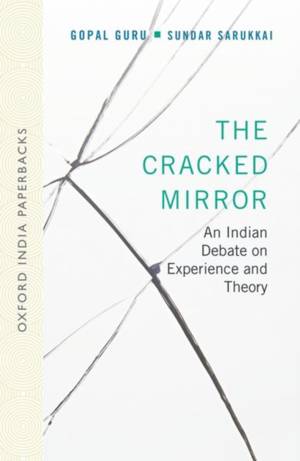
- Afhalen na 1 uur in een winkel met voorraad
- Gratis thuislevering in België vanaf € 30
- Ruim aanbod met 7 miljoen producten
- Afhalen na 1 uur in een winkel met voorraad
- Gratis thuislevering in België vanaf € 30
- Ruim aanbod met 7 miljoen producten
Zoeken
The Cracked Mirror
An Indian Debate on Experience and Theory
Gopal Guru, Sundar Sarukkai
Paperback | Engels
€ 13,95
+ 27 punten
Omschrijving
An enduring challenge confronts the practice of social science in India and other non-western countries. For long, the experiences of these societies have been largely described by theoretical vocabulary and methods drawn from mainstream western intellectual traditions. This has led to two kinds of asymmetries in knowledge production in the social sciences. One is the overwhelming dependence on these western theories in order to make sense of non-western experiences along with the concomitant rejection of indigenous intellectual traditions. The other is the reluctance of the western academia to draw on both non-western writers as well as their intellectual traditions. The politics of these processes is that the experiences of the non-west are dominantly being defined by the theoretical constructs of the west. Using the format of a dialogue between two authors, this book confronts these issues by first beginning with an analysis of the nature of experience followed by an argument for an ethics of theorizing. These issues about the politics of experience and ethics of theory are discussed within the context of theorizing dalit experience and conceptualizing the problematic category of untouchability, by drawing upon both Indian and Western intellectual traditons.
Specificaties
Betrokkenen
- Auteur(s):
- Uitgeverij:
Inhoud
- Aantal bladzijden:
- 264
- Taal:
- Engels
Eigenschappen
- Productcode (EAN):
- 9780199474592
- Verschijningsdatum:
- 27/09/2017
- Uitvoering:
- Paperback
- Formaat:
- Trade paperback (VS)
- Afmetingen:
- 137 mm x 216 mm
- Gewicht:
- 181 g

Alleen bij Standaard Boekhandel
+ 27 punten op je klantenkaart van Standaard Boekhandel
Beoordelingen
We publiceren alleen reviews die voldoen aan de voorwaarden voor reviews. Bekijk onze voorwaarden voor reviews.











